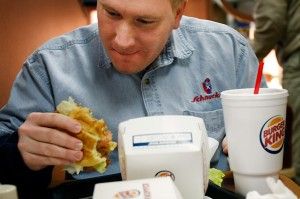Burger King begins deliveries in D.C., plans to expand

January 25, 2012
Dropped sales are leading Burger King to experiment with home deliveries, after the burger chain lost its No. 2 fast food position to Wendy’s.
Sixteen stores in the Washington, D.C., area are the first to try out home delivery in the U.S., while the option is already widely available in Mexico, Turkey, Brazil, Columbia and Peru.
Austin Bean, a sophomore from Effingham studying radio-television and theater, said he finds BK’s idea interesting.
Advertisement
“All those restaurants that deliver, like Domino’s and Jimmy John’s, are doing very well, so I think it’s a good direction for Burger King to go in,” he said.
Bean also said fast food home delivery is beneficial to students.
He said since many students on campus don’t have a vehicle, they can’t get to restaurants. Delivery, then, solves the problem of living in the residence halls.
“Now the food can come to us,” Bean said.
Public Relations for Burger King Corp. sent an email regarding what the home delivery option will consist of but offered no additional information.
The corporation said in a statement there is no specific time planned for a national rollout.
It stated customers can order by phone or online, but they must live within a 10-minute drive from the restaurant’s location. There is a charge of $2 per order and a minimum order of $8 to $10, depending on the store.
Advertisement*
Fountain drinks, milkshakes, coffee and breakfast items will continue to be in-store only, but specially marked meals like 40-piece chicken tenders and two bottled drinks for $10.99 and four large sandwich combos for $23.99 will be available for delivery.
Like Bean, Hailey Pendola, an undecided freshman from Chicago, said she’s all for Burger King home delivery.
“I don’t have a car, so being able to get food by phone or online is really handy,” she said.
While Bean and Pendola said BK’s home delivery option could be beneficial in terms of convenience, registered dietitian Beth Michaels at Memorial Hospital said increased convenience will be offset by the financial and physical cost that comes with it.
She said fast food is more expensive than many meals that can be prepared at home, and along with the delivery charge, consumers are spending more than necessary.
Andrew Moschino, a freshman from North City studying mechanical engineering, said he agrees BK’s delivery is unnecessary.
“Pizza’s the only thing that should be delivered,” he said. “I know I live in the dorms, but that’s what a meal plan is for. I won’t pay extra for Burger King to be delivered to me when I can just go to the dining hall and eat healthier.”
Jacqui Wilcox, nutrition counselor for resident hall dining, said Burger King home delivery would play a convenience factor in people’s day-to-day activities but not for people’s health.
“Fast food contains a high amount of calories, sodium and fat,” she said. “A Whopper with a regular-sized fry and Coke has about 1,300 calories, over 15 milligrams of sodium and 40 grams of fat.”
She said the average person is supposed to eat about 2,000 calories a day. The fat and calories in a Whopper meal is over half that intake just in one meal.
Bean said he doesn’t think it will affect his health unless he orders it every day of the week. Pendola said the only health risk she sees is people gaining weight.
“Though home delivery can be helpful or useful, it will certainly not help the obesity in America, which is stemming from overconsumption, low nutrient-dense food and beverages combined with lack of physical activity,” Michaels said.
Wilcox said she agrees obesity is an issue and home delivery makes unhealthy food even more readily available. She also said fast food has a high amount of saturated fat, which has fewer nutrients.
“Nutrients and protein are extremely important,” she said. “Fast food has a low amount of it, which can make the body tired and waste down your energy levels, making you sleepy.”
If Burger King’s home delivery is an option someone wants, Wilcox and Michaels have advice on how to balance it out and how to help remain healthy and prevent heart disease, diabetes and other chronic health problems caused by poor dietary choices.
“There are other alternatives out there,” Wilcox said. “You can learn to cook at home, or if you want to have fast food, you can substitute fries for a side salad and drink water instead of a fountain drink.”
Michaels said watching portion size and eating in moderation is key.
“Even the worst food imaginable is probably not going to have that great an impact if it is offset by an otherwise healthy lifestyle,” she said.
Advertisement







